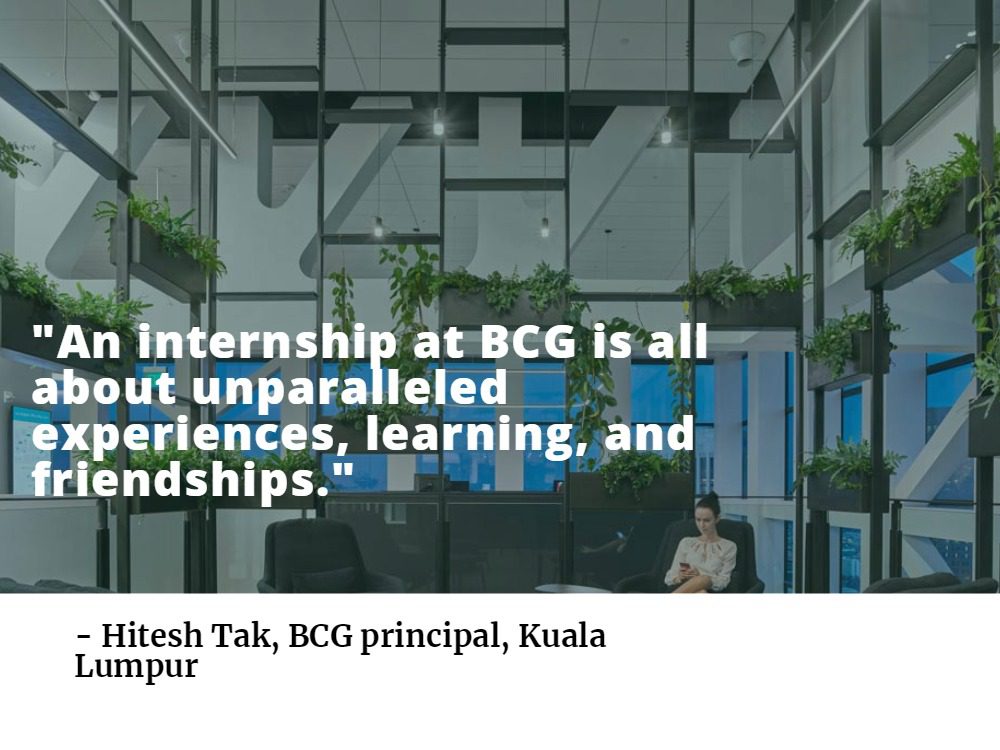How Can You Get a Job at Boston Consulting Group in 2018?

Boston Consulting Company—a global management consulting firm— has offices across more than 90 cities and 50 countries, advising clients in the private, public, and not-for-profit sectors, including a healthy chunk of Fortune 500 companies. Considered one of the most prestigious management consulting firms in the world, BCG was ranked fourth in Fortune’s “100 Best Companies to Work For” in 2018.
But, how can an MBA help you land a BCG job?
Working for BCG
According to Management Consulted, BCG has a demanding recruiting and hiring system. The firm hires undergrads as associates who work for two to three years before moving on or pursuing an MBA. However, it is very difficult and highly unlikely for an associate to make the leap to consultant without an MBA. If you’re hired as an MBA, you enter as a consultant with plenty of room for growth—to project team leader, principal, and then, finally, as a partner partner.
According to former BCG senior partner Lucy Brady, the company looks for a candidate’s record of academic and professional success, but also want to hire candidates who have overcome setbacks.
“We look for resiliency and adaptability, and the ability to learn from your mistakes and grow from them,” she said in a previous interview.
CNN revealed that 11.72 percent of MBAs want to work for BCG. However, BCG’s recruiting process is demanding, with Glassdoor previously ranking the firm among the most difficult companies to interview with.
The high job demand and lengthy interview process isn’t without reason: MBAs typically thrive at BCG due to the companies the emphasis on career development. BCG’s PTO (predictability, teaming, and open communication) policies allow for a healthy work-life balance for employees, which has paid numerous dividends. Internal surveys have shown that the program has led to a 74 percent increase in reported intentions to stay with the company for the long term. BCG was also among the companies that signed the 2016 White House Equal Pay Pledge.
BCG Recruiting on Campus
BCG actively recruits students on college and university campuses around the world. Campus visits are a way for students to connect with BCG, learn more about potential job opportunities, and feel out whether a career at BCG is a good fit.
“We have a presence at many of the top universities across the U.S., including Harvard, Stanford, the University of Pennsylvania, Northwestern, University of Michigan, Duke, and the University of Texas,” Tina Gao, BCG recruiting director, said in a previous interview. “We come to campus and hold a presentation to introduce the company and then are available for Q&A sessions. We also come back to help people train for our interviews and learn more about the company. We’ll come back to campus to interview the candidates we choose.”
You can see more upcoming BCG on campus events here. However, if your campus does not have a dedicated page, BCG encourage students to complete an online application for consulting internships.
BCG Internships
BCG’s consulting internship programs can be a great opportunity for students to get a feel for the the life of a consultant. BCG Associate and Consultant interns work with current BCG consultants, and are expected to contribute to a real client project. Interns are considered as true case team members and are tasked with everything from working on client projects to socializing with colleagues.

According to BCG, internships vary depending on the project or location. Some interns are expected to travel, but do return to their home offices at the end of each week for special events and social activities. Orientation and training sessions ease interns int their roles before being assigned to a case that aligns with their personal and professional goals, as well as the firm’s business needs.
BCG accepts online applications from exceptional business school, engineering, science, law, and humanities students who are nearing the completion of their undergraduate or graduate studies.
BCG MBA Fellows
If you’re an MBA who wants to get your foot in the door at BCG, it’s worth looking into the BCG Fellows MBA Program, which provides top applicants with monetary awards and individual mentorship by BCG consultants.
The fellow program is only available to full-time MBAs studying at the following business programs: Columbia Business School, Fuqua School of Business, Kellogg School of Management, Harvard Business School, MIT Sloan School of Management, Stanford Graduate School of Business, Stern School of Business, Tuck School of Business, Anderson School of Management, Booth School of Business, Ross School of Business, Darden School of Business, The Wharton School and Yale School of Management.
BCG MBA Salaries
If you score a job at BCG, you’ll also be earning a big paycheck—well worth the hours of MBA studies and the rigorous recruiting process. According to Management Consulted, MBAs hired a BCG make earn the following within their first year of employment:
- Signing Bonus: Up to $30,000
- Base: $147,000
- Relocation: $2,000-8,000
- Performance Bonus: up to $44,100
- Retirement: Profit-sharing into a 401k
Chicago Booth Predicts The Workplace of the Future, and More – Chicago News

Let’s explore some of the most interesting stories that have emerged from Chicago business schools this week.
What Will Your Workplace Look Like in 2028? – Chicago Booth Magazine
The University of Chicago Booth School of Business interviewed three of its own homegrown experts to help us understand the potential evolution of the office in the next 10 years. Booth assistant professor of economics Jonathan Dingel believes that place is key. He elaborates: “People are not moving to remote rural areas and using Skype to hold their office meetings. Technologies like this have been around for the last couple of decades, but in fact we are seeing people concentrating in particular cities.”
TandemSpring cofounder Tomer Yogev, ’10, writes that, “the traditional path to the top is changing” for the better.
“In the next decade, there’s going to be an even bigger shift into telecommuting and freelancing roles. Larger organizations will need to find new ways to retain talent who no longer want to have traditional desk jobs. There will be more turnover as people look for more appealing opportunities. And getting fired will not be the death sentence that it used to be,” Yogev says.
Cayse Llorens, Booth Evening MBA student and senior associate at Invest Detroit Ventures, thinks that tomorrow’s workers will grow more “adept at working with artificial intelligence–enabled tools and agents that will increase the value of human skills.”
Read more about Booth’s predictions here.
How Businesses Can Best Use Content Marketing to Generate Leads – Kellogg Insights
Northwestern University Kellogg School of Management professor of marketing Bobby Calder, along with researchers from Medill’s Spiegel Research Center, recently published new research that finds that among B2B companies, “digital offerings like webinars, white papers, and branded blogs are valuable tools that result in more leads and, ultimately, more sales than in-person content-marketing events, such as conferences, workshops, and roundtable discussions.” Calder explains:
“These kinds of digital offerings are really important, right up there with sales contacts. Not only does a digital-content-marketing effort really work in the B2B environment, it offers an opportunity for sales and marketing to come closer together and even integrate their approaches.”
Read more about their research here.
CEOs Gather at Loyola to Discuss Leading for Good – Quinlan School of Business
The Loyola University’s Quinlan School of Business Baumhart Center for Social Enterprise and Responsibility recently hosted the Leading for Good conference in which 45 CEOs and top executives from Colombia, UK, and the U.S. “discussed how to integrate business strategy and social purpose to advance the greater good.
According to the article, “three key themes dominated the conference’s three plenary panels and six breakout sessions.”
- The boundaries are blurring
- Cross-sectorial partnerships are vital to accomplishing large-scale goals; and
- “Social business” is on its way to becoming simply ‘business.’”
You can watch highlights and read more about the insights these business leaders shared here.
Northwestern Explores Healthcare Costs, and More – Chicago News

Let’s explore some of the most interesting stories that have emerged from Chicago business schools this week.
When Healthcare Providers Consolidate, Medical Bills Rise – Kellogg Insight
Despite the claim that hospitals make in terms of cost savings when, say, a GP is acquired by a local hospital, Northwestern Kellogg professor of strategy David Dranove, along with research assistant professor strategy Christopher Ody and Bates White Economics Consulting’s Cory Capps sought to research the real financial impacts of integration for instance among healthcare providers.
The researchers found that from 2007 to 2013, almost 10 percent of physician practices in the data were acquired by a hospital. Once acquired, prices for the services provided by those physicians rose an average of 14 percent. “The rising prices are partly due to ‘mechanical elements’ of how prices are set in contracts,” with insurers, Dranove says. For example, insurers often write contracts that allow hospitals to bill more for a procedure than a physician group can. Additionally, Dranove says, “when a hospital owns a physician practice, they gain market power.”
You can learn more about the trio’s research here.
Economics Professor Studies Monetary History of Ecuador – Loyola Quinlan School of Business Blog
Julián P. Díaz, Ph.D., Quinlan School of Business assistant professor of economics, recently presented research on the financial history of Ecuador between 1950-2015 as part of a conference that explored the macroeconomic crises of the 11 largest Latin American countries.

“The Latin American Debt Crisis of the 1980s made this strategy unsustainable since international creditors stopped lending to Ecuador, and the rest of the region. This should have prompted a significant fiscal adjustment, which, however, never really took place in a significant manner. Instead, the government resorted to seigniorage—printing money—to finance a large portion of its spending. This in turn led to a lengthy period—almost three decades— of persistently high inflation, which averaged nearly 30 percent between 1972 and 1999.” – Julián P. Díaz, Ph.D.
“Businesses operate in environments influenced by governments’ actions,” he notes. “Identifying fiscal and monetary policies that lead to undesirable outcomes and hurt the ability of businesses to thrive is of critical importance. For our students, many of the tools used to analyze the countries’ performances in this project are taught in a number of economics classes at Quinlan. This highlights the fact that the topics we cover in class are not just theoretical exercises. They are being used to understand why some countries fail, and what can be done so that such costly experiences are not repeated in the future.
You can check out the full interview with professor Diaz here.
Investing for Social Impact – Chicago Booth Magazine
The University of Chicago Booth School of Business’ Rustandy Center for Social Sector Innovation has become a frontline for investing “with the intention to generate social and environmental impact alongside a financial return” or what has become more commonly known as “impact investing.” Impact investors are a growing segment of managers, consultants, and professionals who seek to blend their financial acumen with “their commitment to improving people’s lives and the health of the planet.”
“Impact investing is just increasing at a faster and faster pace,” Rogers said. “I think it’s a very promising career, and I think the industry will continue to grow as millennials become more socially conscious about how they’re investing their money.”
Read more about the future of impact investing here.
How Natural Disasters Can Turn into Economics Disasters – Chicago News

Let’s explore some of the most interesting stories that have emerged from Chicago business schools this week.
Localized Natural Disasters Can Hurt an Entire Country’s Economy – Kellogg Insight
Northwestern Kellogg School of Management associate professor of managerial economics and decision sciences Alireza Tahbaz-Salehi set out to understand the large-scale economic implications of natural disasters.
Tahbaz-Salehi worked with Vasco Carvalho of the University of Cambridge, Makoto Nirei of the Ministry of Finance of Japan, and Yukiko Saito of the Research Institute of Economy, Trade and Industry in Japan. After the 2011 earthquake, “disaster-affected firms’ connections to companies outside the regions affected by the quake had a strong effect: these links accounted for a 1.2 percent decline in Japan’s gross economic output the year after the disaster.”

The aftermath of the 2011 earthquake in Japan hurt economic productivity for a lengthy period of time. Photo via Reuters
Tahbaz-Salehi says, “If these shocks start propagating from a firm to its customers, to its customers’ customers, and so on, they may also have an aggregate effect on the entire economy. But there have been almost no empirical studies to document whether these effects exist and how big they are.”
You can read more from Kellogg Insight here.
Hitting Rock Bottom After Job Loss Can Be Beneficial – Mendoza College of Business
To paraphrase Beckett, “Try, fail, try again, fail again, fail better.” Notre Dame Mendoza College of Business‘ Siegfried professor of entrepreneurship Dean Shepherd recently co-authored a study in Academy of Management Review with Indiana University’s Trenton Williams, which finds that on the road to success, failure is often the most revealing option.
“On the way down, we frantically do all sorts of things to try and repair the situation, and suffer as they fail. Bottoming out frees us from the misconception that the problems can be fixed, and in the process, frees us from other constraints and negative emotions and provides the conditions necessary to find a viable solution.”
He continues:
“‘A failed corporate executive might consider a variety of other potential roles,’ Shepherd says. ‘For example, sitting on the board of a nonprofit organization that is desperate for experienced managerial guidance, exploring government positions or running for office, working with startups, and so forth. Similarly, a failed entrepreneur might explore how skills learned in starting a business could be applied in a corporate setting, take standardized exams to be considered for law school or engage in other low risk exploration activities. In these cases, hitting rock bottom opens up myriad new opportunities.’”
Read more about the duo’s research here.
Would You Pay $20 a Day to Lease a Luxury Car? – Booth School of Business
University of Chicago Booth School of Business associate professor Daniel Bartels and the University of Rhode Island’s Stephen Atlas are scheduled to publish a new study in the Journal of Consumer Research entitled, “Periodic Pricing and Perceived Contract Benefits,” which finds that people “perceive more benefits from their purchases if they make payments on a periodic basis.”

Research from Booth shows that people feel their purchases are more valuable if its paid off in repeated cycles. Photo via NY Auto Show.
“Our framework and results suggest that periodic pricing can help people appreciate the benefits they accrue from a purchase. So, under the right conditions, marketers can encourage purchase with periodic pricing, even for significant sums of money.”
Read more about the duo’s research here.
Misty Johnson Named Business Dean – DePaul Driehaus College of Business and Kellstadt Graduate School of Business
As of March 1, the Driehaus College of Business and Kellstadt Graduate School of Business formally introduced its newest business college dean, Misty Johnson, Ph.D.
Johnson became the interim dean of the business college back in July, replacing former dean Ray Whittington. With her role now official, she has become the first-ever female dean of DePaul’s business school.
“Dr. Johanson has done a laudable job, and I’m pleased the college will continue to benefit from her leadership and expertise,” DePaul University Provost denBoer said in a press release.
“During her tenure this academic year, fall graduate business enrollment increased 16 percent; staff roles were reimagined to enhance the student experience; master’s program and center directors began collaborating more closely to support graduate program success, and the college forged stronger industry connections to support career opportunities. Johanson also launched a campaign with the Office of Advancement to raise $4 million for the college by the end of the academic year and exceeded the goal within the first six months.”
You can read more about the official appointment of Dr. Johnson here.
Chicago News: Northwestern on Bitcoin, Notre Dame Explores Psychopathy and More

Let’s explore some of the most interesting stories that have emerged from Chicago business schools this week.
New Cryptocurrencies, Same Old Problems – Kellogg Insight
Following Bitcoin’s record high $19,511 BPI at the end of 2017, which has already begun its slow steady decline (its BPI is around $10,800 as of Feb 19), folks outside the standard-issue Silk Road users and modern-day gold prospectors have begun to openly (and loudly) question whether we’re due for a global cryptocurrency takeover. Northwestern University Kellogg School of Management professor Sarit Markovich advises eager beavers to slow their rolls:
“There are certainly huge advantages to blockchain technology, especially when it comes to cross-border transactions. But I doubt we’re going to reach the point where decentralized cryptocurrencies replace cash or distributed ledgers replace central banks. There’s too much room for manipulation. Instead, it looks like the real innovation will occur within large institutions, which is not exactly democratization.”
Markovich goes on to note another problem with the current state of Bitcoin, which is the preponderance of “whales” mining the currency. He explains:
“In addition to ‘mining pools,’ there is also the problem of ‘whales:’ roughly 1,000 people own around 40 percent of all bitcoins. As the market continues to rise, there is a risk that some may be in a position to manipulate the market. For example, they could collude in an effort to drive the price of Bitcoin up, then cash out all at once—and perhaps even bet against the futures market.”
Read more about the future of cryptocurrency here.
Psychopaths Tend to Benefit and Flourish Under Abusive Bosses – Mendoza Ideas & News
Got a boss from H-E-double hockey sticks? You’re not alone. But what might make you unique is your ability to stand heat. It turns out some folks actually do quite well under cruel conditions. It also turns out that these folks might have more in common with Richard Ramirez or John Wayne Gacy than they’d care to admit, according to a new study by Notre Dame Mendoza College of Business assistant professor of management Charlice Hurst:
“We found that primary psychopaths benefit under abusive supervisors. Relative to their peers low in primary psychopathy, they felt less anger and more engagement and positive emotions under abusive supervisors.” “It may reward and retain exactly the kind of people who are likely to perpetuate abusive cultures,” she says. “Psychopaths thriving under abusive supervisors would be better positioned to get ahead of their peers.”
Hust continues, saying:
“If they have a problem of endemic abuse, like Wells Fargo — where former employees have reported that managers used tactics designed to induce fear and shame in order to achieve unrealistic sales goals—and upper-level managers are either unaware of it or are not taking action, they might notice increasing levels of engagement due to turnover among employees low in primary psychopathy and retention of those high in primary psychopathy. At the extreme, they could end up with a highly engaged workforce of psychopaths.”
Read more about Dr. Hurst’s research, entitled “Are ‘Bad’ Employees Happier Under Bad Bosses? Differing Effects of Abusive Supervision on Low and High Primary Psychopathy Employees,” here.
Financial Compensation Can Distract From Emotional Suffering – Chicago Booth Review
University of Chicago Booth School of Business professor Christopher Hsee, Northwestern professor Xueer Yu and Ph.D. candidate Shirley Zhang recently explored the complex analysis required to compensate victims who suffer grave psychological, physical, and financial duress.
What the trio found, surprisingly, is that psychological and physical distress was often much more rewarding than financial damage. And even mentioning financial damage, coupled with psychological and physical damage, often hindered compensation.
The reason? Financial damage is generally empirical and can be exacted with ease.
“It would be better to say ‘I was so scared that I lost two nights’ sleep’ than to say ‘I was so scared that I lost two nights’ sleep and one day’s work,’” the researchers write. “If the victim mentions one day’s work, the mediator would likely compensate the victim for only her one day’s pay. If the victim does not mention one’s day work, the mediator would likely award more, unless the victim has a high-paying job and the judge is aware of it.”
Read more about their research, recently published in the January issue of Organizational Behavior and Human Decision Processes, here.
MBA on the Lake: Higher Learning in Chicago & Toronto

To have some type of natural source to balance out the cacophony of city life is crucial to a healthy mind. Not every major city is a concrete jungle, completely broken off from its former natural self or its surroundings. It might surprise city slickers the amount of wilderness opportunities that exist just outside their doorstep.
Take Toronto, for instance. Situated on the shoulder of Lake Ontario, Toronto is surrounded by plateaus, deep forest, ravines, and three rivers. While other Canadian cities may beg to differ, Toronto is the financial and cultural capital of the country. It has long been a hub for migration since the days of the Huron and Iroquois and houses the five largest financial institutions in Canada.
As the heart of American transportation and distribution, Chicago’s metropolitan reputation belies its abundance of natural splendors. Located at the toe of Lake Michigan, the Second City plays host to a wide array of green spaces—arboretums, nature centers, conservatories, and botanical gardens—as well as lakeside walking and biking paths.
Both Chicago and Toronto are world centers for higher education and research, yet offer resplendent surroundings to maintain a balanced state of mind. Both offer much more affordable living situations than New York or San Francisco and are highly underrated for their cultural appeal. Whichever you choose, you will find established, reliable education in your pursuit for the proper MBA. Last month, we analyzed the best part-time offerings in both metros, but let’s take a closer look at the full-time MBA options.
Our Favorite Toronto Full-Time MBA Programs
York University – Schulich School of Business
The Schulich School of Business at York University offers 18 MBA specializations. In addition to full-time programs, the school also accommodate working students with part-time programs that offer both day and evening courses. Students are also able to switch between full and part-time status during their tenure to suit their needs. In 2016, 89 percent of students were hired within three months of graduation by 140 companies. Graduates were employed with an average salary of $91,860 USD and an average signing bonus of $12,050.
McMaster University – DeGroote School of Business
DeGroote School of Business at McMaster University offers full-time and part-time options, as well as a three-year paid work term co-op schedule. Full-time applicants are required to have one year of full-time continuous managerial, professional, or technical work experience (this is where the Co-op plan can come in handy—work as you go). The school offers seven specializations and International study. About 94 percent of recent graduates were employed within six months (over the last two years) with an average starting salary of $71,930 USD.
Western University Canada – Ivey Business School
The Western University Canada Ivey Business School is technically located just outside of Toronto, in London, Ontario. The school offers a full-time program that gives students an opportunity to work with over 200 recruiters, with about 66 percent of graduates finding jobs in Canada. In 2017, 91 percent of the graduating class received a job offer by September 1. Average starting salaries were typically around $90,000 USD with an average signing bonus of $15,000. Other compensations averaged at $9,875.
CHECK THIS OUT: Kings of the North: Should You Get a Part-Time MBA in Chicago or Toronto?
University of Toronto – Rotman School of Management
Students in the Rotman School of Management full-time MBA program are offered 16 major options and more than 90 electives to allow for a very customizable experience. Between 2016 and 2017, 85 percent of full-time Rotman MBA students were employed within six months of graduation and 80 percent landed jobs just within three months. Average starting salaries were $85,000 USD with an average signing bonus of $13,500.
Ryerson University – Ted Rogers School of Management
MBA applicants at the Ted Rogers School of Management at Ryerson University are given two full-time options: the Global MBA or an MBA in the Management of Technology and Innovation (MBA-MTI). Their Global MBA program strives to help their graduates “understand the global context of various industries and have the knowledge necessary to drive innovation and deliver as capable and confident leaders.” The MBA-MTI helps students “gain the skills needed to manage within companies that are focused on tech and innovation.” Last year, about 80.3 percent of graduates found employment within three months of graduation and earned an average starting salary of $89,250 USD.
Our Favorite Chicago Full-Time MBA Programs
Booth School of Business – University of Chicago
The University of Chicago Booth School of Business offers what the school calls the “world’s most flexible MBA program,” and is regarded by U.S. News & World Report as the third best full-time offering in the U.S. The curriculum consists of 20 classes—nine mandatory and 11 courses tailored to personal interest—plus a Leadership Effectiveness and Development (LEAD) program. As of September 2017, an absurd 97.1 percent of graduates reported having received full-time job offers within three months, with 95.3 percent accepted offers in that time. Average starting salaries were an impressive $125,000 with an average starting bonus of $25,000.
Kellogg School of Management – Northwestern University
The Kellogg School of Management at Northwestern University offers two full-time MBA variations, either to be completed in one or two years. The school’s 2017 employment report, which can be downloaded here, detailed that 94.1 percent of graduates received job offers within three months and 90.8 percent of those grads accepted job offers. The average starting salaries for graduates with three-to-five years of work experience was an unsurprisingly lavish $128,686.

Like the Booth School of Business, when comparing Chicago and Toronto programs, financial gain is clearly an advantage for those who elect to study in the U.S. However, perhaps unsurprisingly, schools like Kellogg come with a steeper tuition cost. Applicants for the One Year full-time program should expect to pay more than $133,000 for the entire program, while those in the Rotman School of Management will have to pay around $75,000 USD.
Kellstadt Graduate School of Business – DePaul University
At the DePaul University Kellstadt Graduate School of Business, students can obtain a full-time MBA with the availability of 100 courses in 20 MBA concentrations and 17 specialized Master degrees. In 2016, within six months 89 percent of surveyed graduates were employed, 14 percent being entrepreneurial, contract or freelance. Average starting salaries were about $82,200.
Liautaud Graduate School of Business – University of Illinois at Chicago
The Liautaud Graduate School of Business at the University of Illinois at Chicago full-time MBA is a 13.5 course program, with six courses designed to deepened functional business knowledge, while the remaining 7.5 are geared towards allowing students to customize their experience towards their personal career interests. They provide twelve concentrations in their MBA program.
Mendoza College of Business – Notre Dame
The Mendoza College of Business at Notre Dame University offers two traditional full-time MBA options, which can be taken in two years, or just one in a more accelerated format. According to employment statistics recently released by the business school, about 88 percent of Two-Year full-time students were given a job offer within three months of graduating, with about 86 percent of those graduates accepting the offers. Like many of the major business schools located in the Chicago metro (although, yes, Notre Dame is technically in Indiana), full-time MBA grads enjoyed a lush base salary upon employment, with an average salary of $105,000 for the Class of 2017. Median signing bonuses also ranked in the higher end of the schools on this list, coming in at around $20,000.
The Mendoza College of Business is one of the many business schools in the U.S. that has seen a dramatic shift in terms of graduates moving into the tech industry. Three industries in particular dominated when it came to employing Mendoza MBA grads: tech, financial services, and consulting. However, a slim majority (24.7 percent) joined the tech industry, enjoying salaries slightly higher than the Mendoza average, coming in at $110,000.
Quinlan School of Business – Loyola University
The Quinlan School of Business offers full-time MBA offering is one of the most affordable high-quality Chicago options out there, with the most recent full-cost of the program coming in at $73,422; comparable to many of the aforementioned Toronto programs. And unlike many of the programs on this list, Quinlan isn’t located in some quaint suburb. Rather, the school is centered right on the historic Magnificent Mile in Chicago, fully integrated into the vibrant city.
